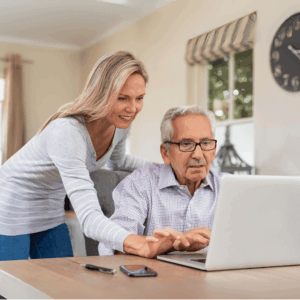Staying active is crucial to staying healthy. However, nearly nine out of ten senior Australians do not get enough exercise.[1] It is recommended that all people over 65 get at least 30 minutes of moderate-intensity physical activity on most or all days of the week.[2] Regular exercise helps to reduce health issues such as high blood pressure, heart disease, and type 2 diabetes. It also helps to reduce anxiety and get a better night’s sleep. At Home Care Assistance, we understand the benefits of staying active. However, we also know that exercising safely in warmer weather is important. We have put together this blog on how to stay active safely in warmer weather.
While exercise is good, there are some risks to exercising in warmer weather, especially for older people who may not regulate their body temperature efficiently. These risks include dehydration and heat-related illnesses. Overheating can then exacerbate underlying health conditions such as heart disease, kidney disease, and diabetes. Therefore, it is essential to take care when exercising in warmer weather.
Choose a Cooler Time of Day
Exercising in the early morning or late in the day when it is cooler is a good approach to exercising in warmer weather. The cooler it is outside, the less likely a person is to get too hot exercising. This also reduces the risk of sunburn as you avoid the part of the day when the sun is at its hottest.
Wear Appropriate Clothing
Light-weight, breathable fabrics are best for exercising in warmer weather. It is also essential to wear a hat and sunscreen when exercising. Appropriate footwear is also important to protect against hot surfaces and any snakes that might be out and about.
Extra tip: If you are taking your dog for a walk, remember to protect their paws from hot surfaces, too!
Stay Hydrated
While it is generally important to stay hydrated, this is particularly relevant when exercising in hot weather. Make sure you have plenty of water to drink before, during, and after your exercise. Avoid drinks that can cause dehydration, such as caffeine and alcohol.
If you have been sweating a lot, you may also want to consider having some electrolyte drinks on hand. Look for sugar-free versions if you are trying to minimise your sugar consumption.
Select Suitable Activities
You may need to modify your activity during hot weather, particularly heat waves, where it does not cool down much at night. Instead of exercising outdoors, consider an indoor alternative. A gym is a great option here, and many gyms offer classes for seniors. Alternatively, you can even walk in your local indoor shopping centre or set up a series of activities at home – large cans of food can make great weights. Another option is swimming so you can exercise and cool off at the right time. If you exercise outside on a sunny day, stay in the shade as much as possible.
Stay Close to Home and Take a Buddy
You may also want to stay close to home. If your chosen activity is walking, choose a route close to home. If the heat is too much, you can head home quickly. Walking with someone and carrying your mobile phone can also be a good idea. If something goes wrong and you are not feeling well, you can access help easily. If you receive support at home from a specialised provider such as Home Care Assistance, you can exercise when your Care Professional is on hand.
Allow Your Body to Acclimatise
If the weather warms up suddenly, give your body a chance to get used to the heat. You may need to reduce the length and intensity of your exercise initially while you get used to the heat. Rest days can also be important in hot weather when you feel drained from the heat, even without exercising.
Take Care After Exercising
When you have finished exercising, make sure you drink plenty of water, have some food to refuel, have a shower (aim for cool but not cold), and put on dry clothes. Staying in hot and sweaty clothes after you exercise can cause skin irritations, so it is best avoided.
Seek Medical Care if Needed
Heat-related illness can be dangerous, especially in older people. If you feel unwell after exercising in warmer weather, seek urgent medical care. Do not hesitate to call a friend or family member or an ambulance.
Exercising in warm weather does come with some challenges, and it is important to do it safely. However, if you follow these tips, you can exercise safely and still reap the benefits.
Support at home from a specialist provider, such as Home Care Assistance, can bring enormous benefits and comfort to your quality of life while living independently. Home Care Assistance has viable solutions for supporting independent living. For more information, get in touch with a Home Care Assistance near me today.
[1] https://www.aihw.gov.au/reports/physical-activity/physical-activity
[2] https://www.health.gov.au/topics/physical-activity-and-exercise/physical-activity-and-exercise-guidelines-for-all-australians/for-older-australians-65-years-and-over
As a leading age care provider, Home Care Assistance offers tailored in-home care services for older Australians, enabling them to live happier and healthier lives in the comfort of their own homes.
We offer private and government subsidised Care Packages and have office locations that are a registered NDIS provider. Our Care Workers undergo extensive training in order to deliver unmatched in-home aged care services where people can continue ageing in place. We are proud ambassadors of the My Aged Care government funded aged care program, enabling Australians to successfully navigate the process and gain approval for in-home care support packages. Home Care Assistance offers hourly care, specialised care, Alzheimer’s and Dementia care, hospital to home care, and 24 hour in home care.













